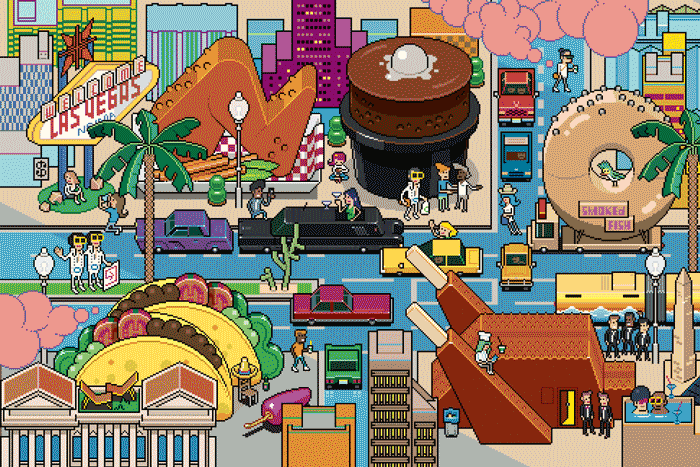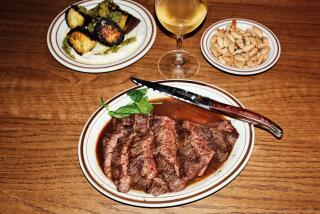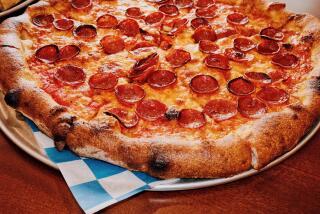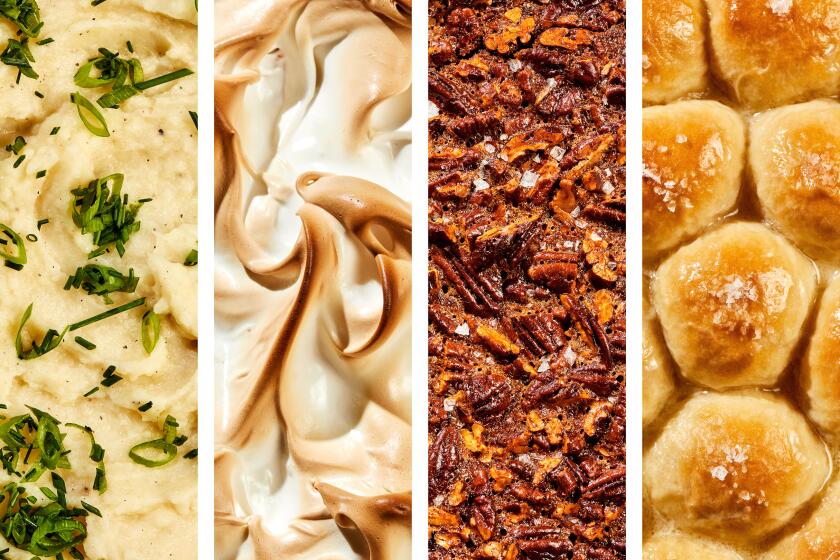LAS VEGAS — Platters and steamer baskets are arriving fast at Rainbow Kitchen, a Cantonese restaurant that anchors the western end of a single-level, sand-colored strip mall south of Las Vegas’ remarkable Chinatown. They cover the table with the heart-racing variety that can make dim sum such a joy.
I reach for the har gow as soon as a server whizzes by with our order. The translucent wrappers pleated around the shrimp dumplings fit as snugly as cocoons. Too many versions of har gow cleave to the parchment paper beneath them in a gummy mess, but these lift cleanly, and the seafood inside snaps back at the first bite.
For the record:
3:20 p.m. June 10, 2022An earlier version of this post said Rainbow Kitchen is in Las Vegas’ Chinatown. It is several miles south of that neighborhood.
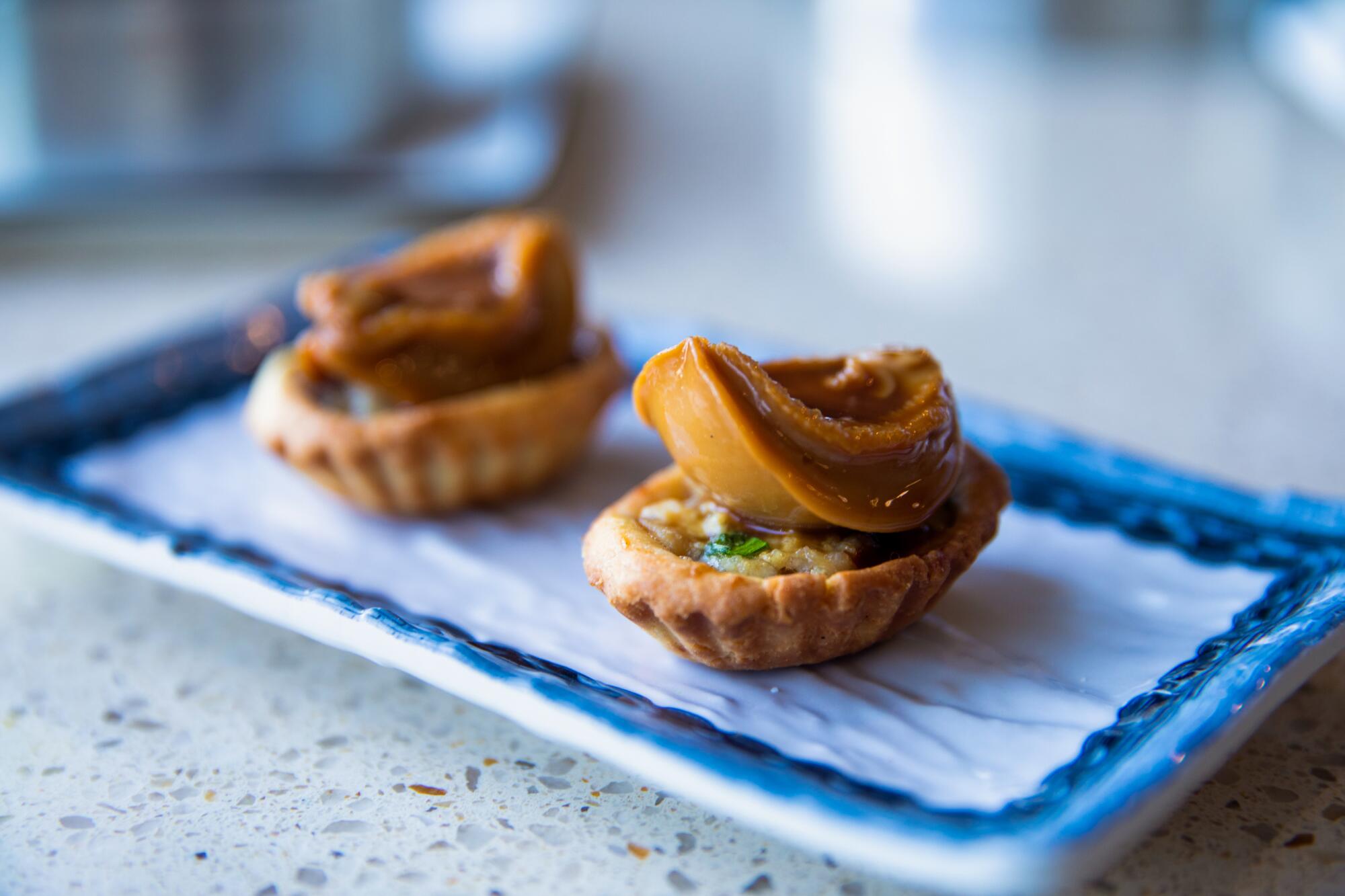
Herbal steam escapes as I unfold the lotus leaf wrapped around glutinous rice. My tablemates and I hunt for slices of lap cheong and dark wisps of chicken suspended in the rice like sticky amber. We plunge our chopsticks into squiggly cheong fun filled with curled shrimp, and sweet, spongy chicken’s feet, and curls of green pepper stuffed with shrimp paste.
Small tarts arrive last, as both showstoppers and a savory sort of dessert. Oval shells of puff pastry hold chicken, mushroom and scallion, all minced. On top of each tart lays an oblong piece of dried abalone, reconstituted to the texture of a firm scallop and lacquered with soy-rich sauce. The tart mimics the shape of the abalone; the flavors flip umami-fueled somersaults. It is exquisite in appearance and taste.
I’ve had the dish once before at Lung King Heen, the three-Michelin-star restaurant in the Four Seasons Hong Kong, where chef Chan Yan-tak engineered the combination. The version at Rainbow Kitchen — where owner Bill Chiang and chef Yung Tse, who both grew up in Hong Kong, are quick to cite the luxe inspiration — rivals the original.
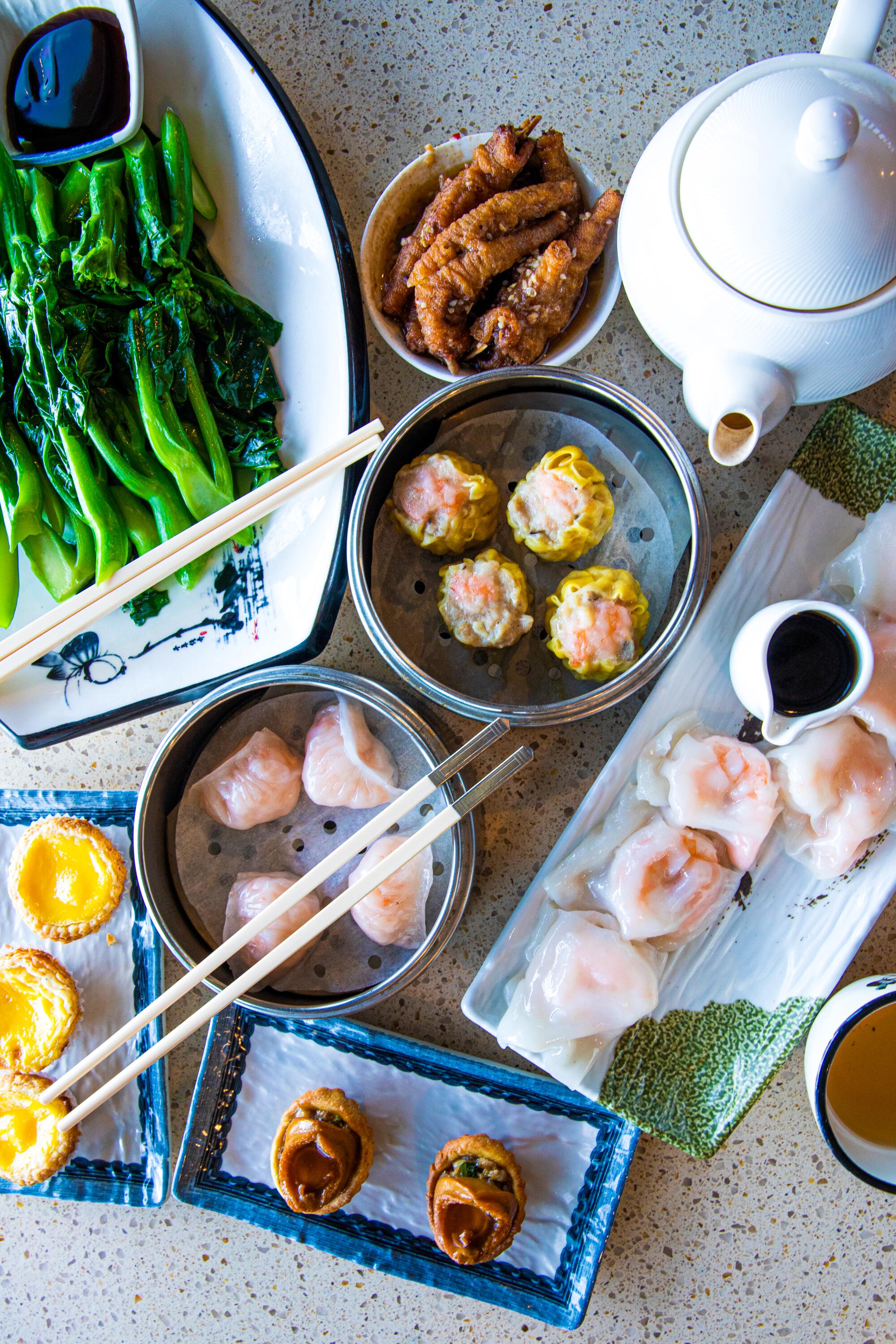
It wasn’t only the abalone tart that left me relishing the meal. In my coast-to-coast travels over the last decade, the delicate finesse of the dumplings and pastries at Rainbow Kitchen made for some of the best dim sum I’ve had in North America.
My first-time experience of the restaurant’s excellent food was thrilling. During a recent week of immersive dining, inspired by Rainbow Kitchen, I turned my focus toward eating through the city’s Chinatown. I soon understood, clearer than ever, that the dynamic, multifaceted area is the most exciting place to eat in Las Vegas.
Whether you’re dining on the Strip or far away from it, in the mood to blow obscene amounts of money or looking for a quick and affordable meal, our dining guide will serve as a shining beacon, like the light on top of Luxor.
A three-mile sweep that begins about a six-minute drive west of the Strip along Spring Mountain Road loosely defines the Chinatown district. It runs between Valley View Boulevard, where you’ll find a curative bowl of chicken pho served at Pho Ga Tony Tony at the intersection’s southeast corner, and the Korea Town Plaza on South Rainbow Boulevard. Its labyrinths of strip malls and shopping complexes is a familiar and promising sight if you’ve ever immersed yourself in the riches of the San Gabriel Valley. It houses nearly 200 restaurants serving the cuisines of China, Japan, Korea, Vietnam, Thailand, Malaysia and the Philippines ... for starters.
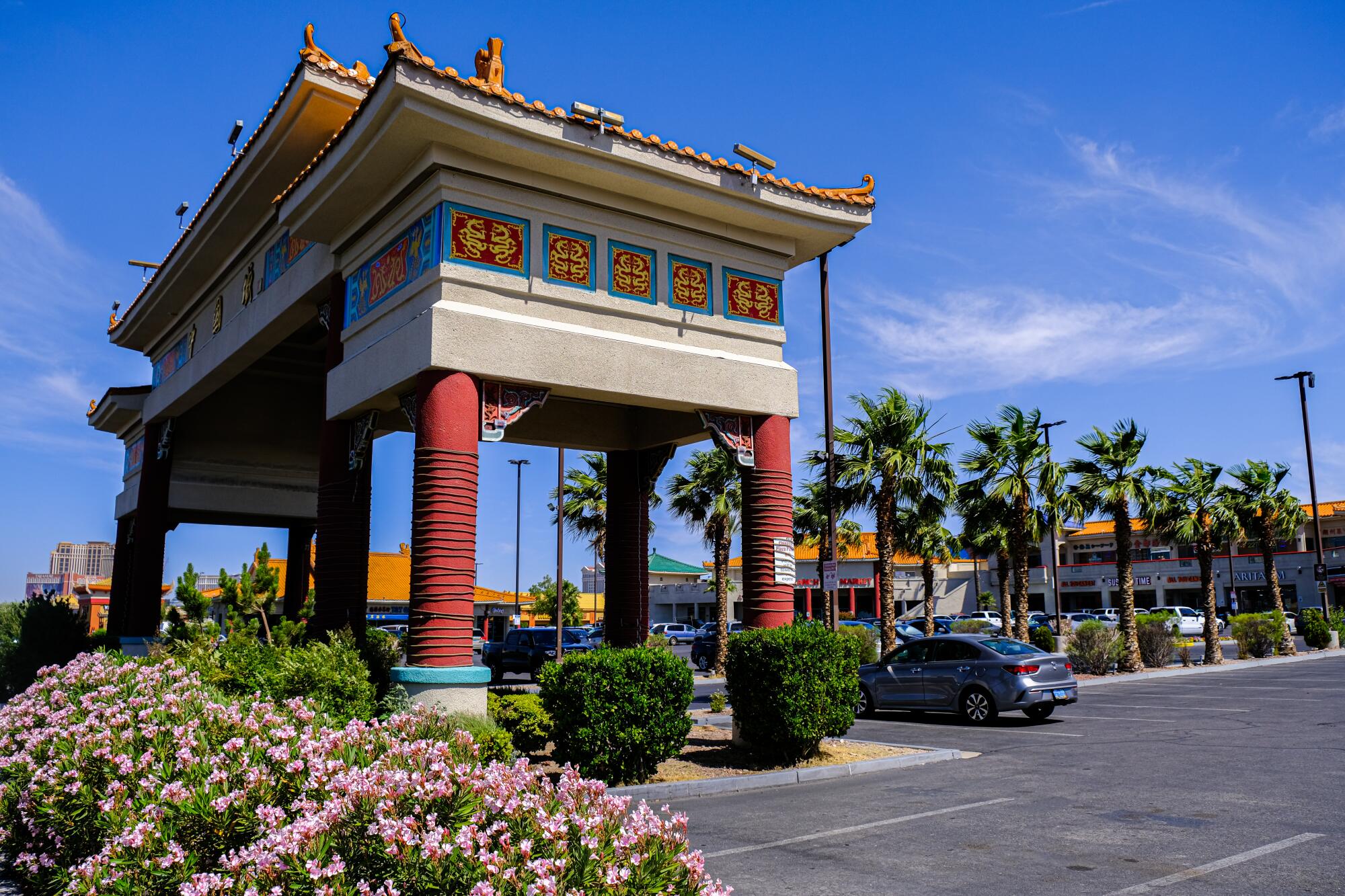
“Asiatown” would be a far more accurate descriptor, but the area’s name has a precedent. Its young existence began with the 1995 opening of Chinatown Plaza, built by James Chen and two business partners, K.C. Chen and Henry Hwan; the trio were high school classmates in Taiwan. They lined roofs with Taiwanese ceramic tiles and installed a paifang inspired by Tang Dynasty architecture as a gateway entrance. Their aim was specific: They created the plaza to serve visiting Asians and Las Vegas’ growing Asian American population. Beyond restaurants, tenants included a real estate office, a wedding chapel and a 99 Ranch Market.
A quarter century later, nearly two dozen shopping centers dot the surrounding landscape. So eating well in Chinatown is no sudden revelation: It’s more that the district has reached a competitive pinnacle of superior options in every tier of dining.
Go west to go east
These days I’ll rest my head at a Strip hotel and stick around for, say, a Silk Sonic concert. When it comes to dining, though, the relentless crowds and the corporate sheen, thicker than ever, have me looking for exit ramps. Also, the compelling restaurant openings lately often come from L.A. chefs and restaurateurs. I already know how good we have it back home. (That said, Roy Choi’s Best Friend in Park MGM is one that’s worth planning ahead for a reservation.)
When it’s mealtime I mostly steer my car west to Spring Mountain Road.
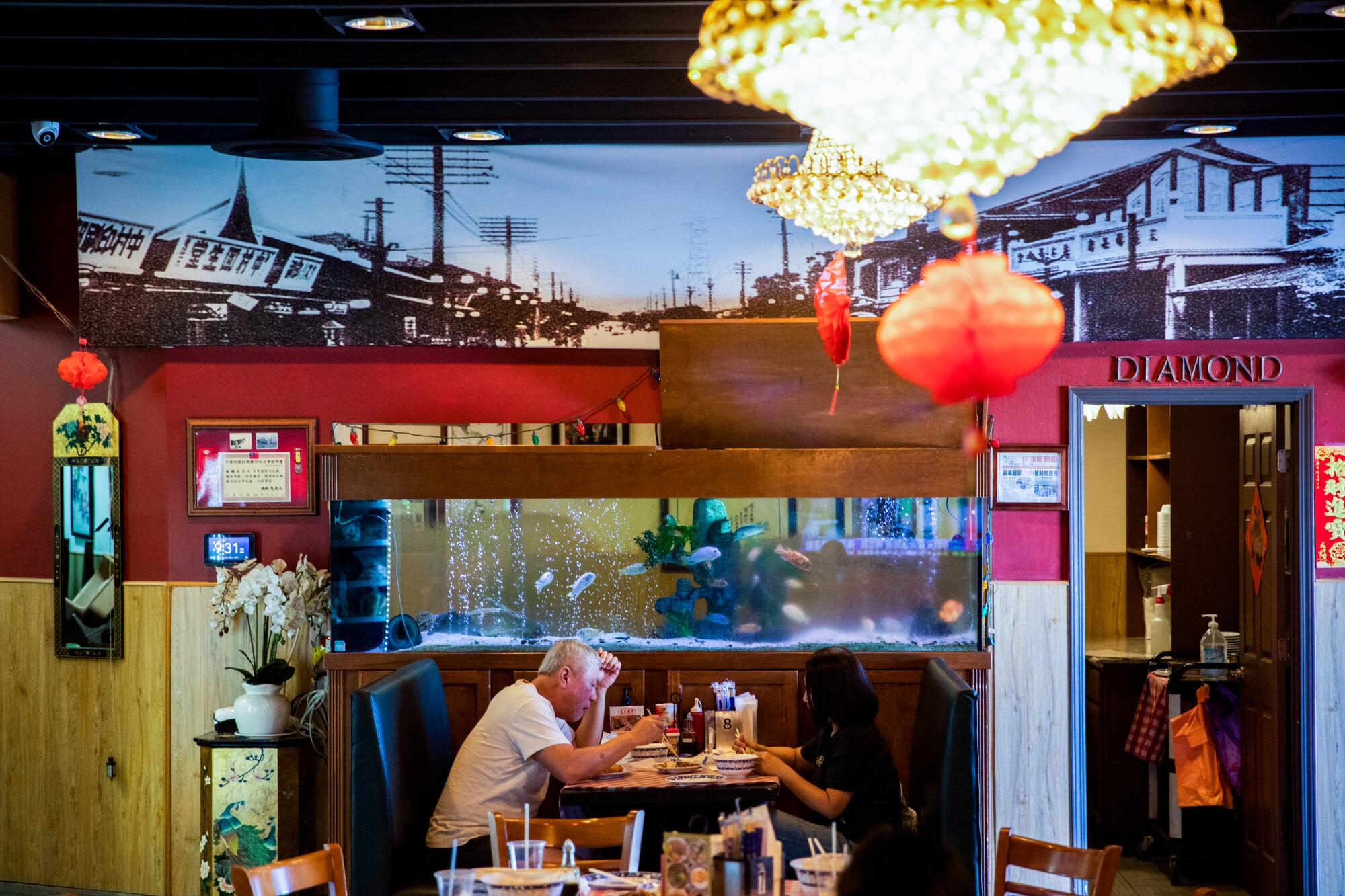
At breakfast, with the temperatures outside already rising, the destination one morning is a booth in the back of Taiwan Deli’s cool, dark room. The long menu channels many of the most popular sunrise street foods in Taiwan: oblong baked savory pastries filled with ropy threads of pork or egg or braised beef and mustard greens; turnip cakes, steamed dumplings and jiu cai he zi (pan-fried hand pies plump with sliced leeks, scrambled egg and vermicelli noodles); variations of fan tuan, its tubes of sticky rice filled with greens or meats; and, on almost every table, bowls of hot soy milk with long, crackling youtiao for dipping.
When I order o ah jian — layered with textures in a swirl of omelet, oysters and sweet potato starch that firms into a gel when it cooks — it amuses our server. “Oh, so you like Taiwanese food!” she says. “You should get the stinky tofu too.” I take her playful dare, and I eat it with pickled vegetables between bites of beef roll and soy milk. It blasts more fermented pungency than plenty of versions I’ve tried in the SGV . I don’t need coffee. I’m thoroughly awake.
Unlike the deep historical contexts of Chinatowns in New York, San Francisco and L.A.’s rebuilt New Chinatown, Vegas’ counterpart was founded with intention as a pluralistic business community; in a real sense it’s designed to be surveyed by cuisine. Can the whole family agree on Korean barbecue? 8 Oz Korean Steakhouse mixes and matches smart combinations of meat — say, boneless short rib, beef belly, pork jowl and gently spicy pork bulgogi — in various sizes and price points, with the very modern inclusion of cheese fondue for dipping. Hungry for a burger? Among the Japanese-inspired creations at Fukuburger, my go-to is the Karai, slicked with avocado cream and habanero kabayaki and crowned with pickled cucumbers; its flavor-texture interplays are at once sharp and soothing.
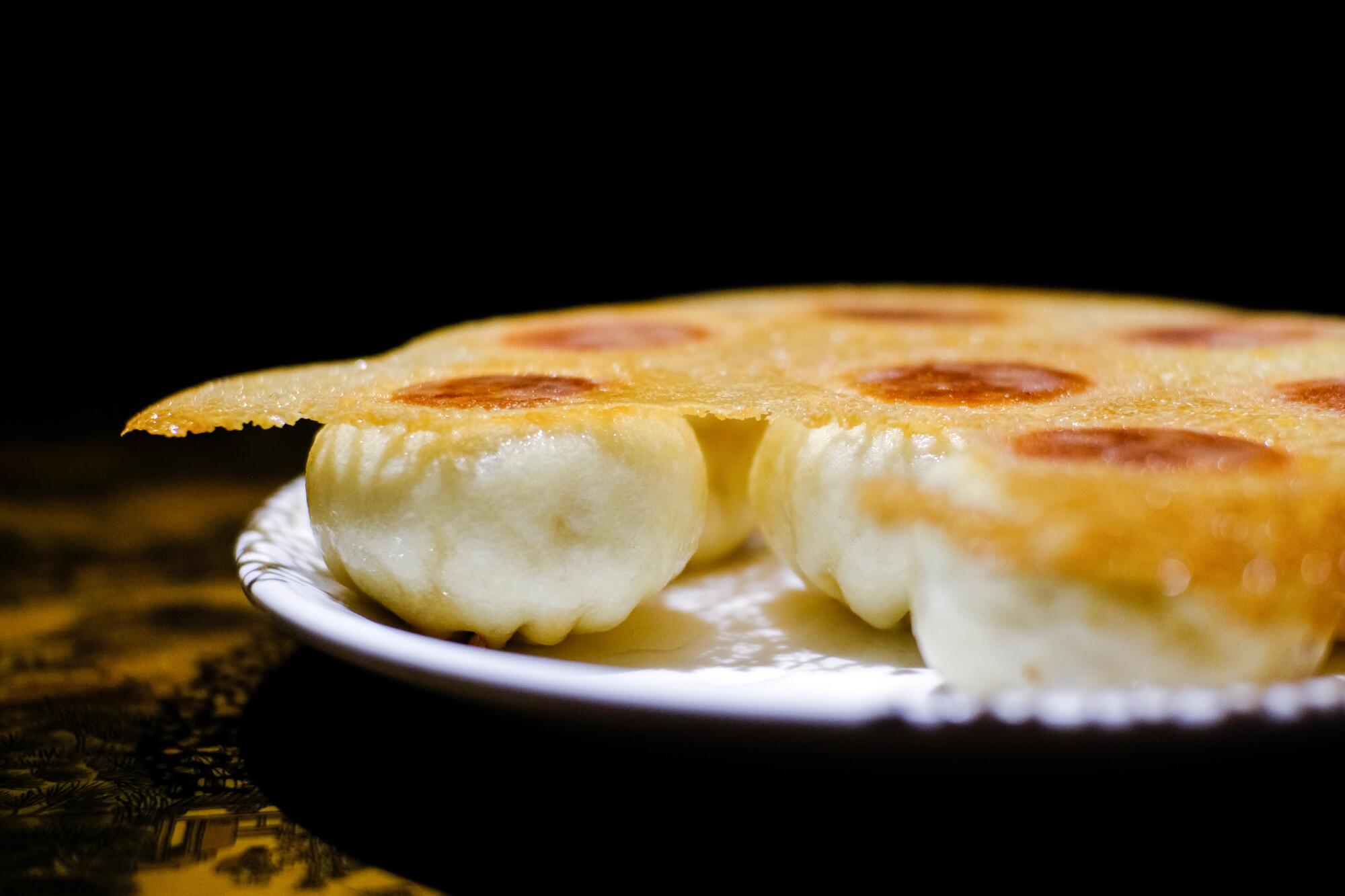
Dumplings? The choices overwhelm, but I have a clear starting point: China Mama, where Ivy Ma excels at sheng jian bao, a cluster of pan-fried pork buns bound in a web of glassy, lacy batter. Follow those with her textbook mapo tofu, the silken clouds adrift in a fiery sunset of Sichuan peppercorn-infused oil.
Given the district’s dominant architectural themes, it also tracks to explore Chinatown by shopping center. Among the grander entrants, Shanghai Plaza opened in 2019: It covers a sprawling 57,000 square feet with a warren of two-story buildings adorned with red brick columns. Its culinary centerpiece, Shanghai Taste, hides inconspicuously among rows of lookalike facades; look for groups gathered outside, waiting for seats or to-go orders.
Shanghainese chef Jimmy Li and business partner Joe Muscaglione opened noodle house Niu-Gu together in 2016, but they’ve found an adoring audience in their new venture. Shanghai Taste’s xiao long bao are the biggest draw. Soup dumplings can suffer from all sorts of engineering issues, but Li’s are structural paradigms: thin yet sturdy wrappers, heavy with broth, with twisted tops that pop off easily for slurping. Wonderful Shanghai-style appetizers — kao fu (braised wheat gluten with a honeycomb texture, paired with wood-ear mushrooms), refreshing bean curd noodles served cold in scallion oil, sweet-and-sour pork ribs — round out the meal.
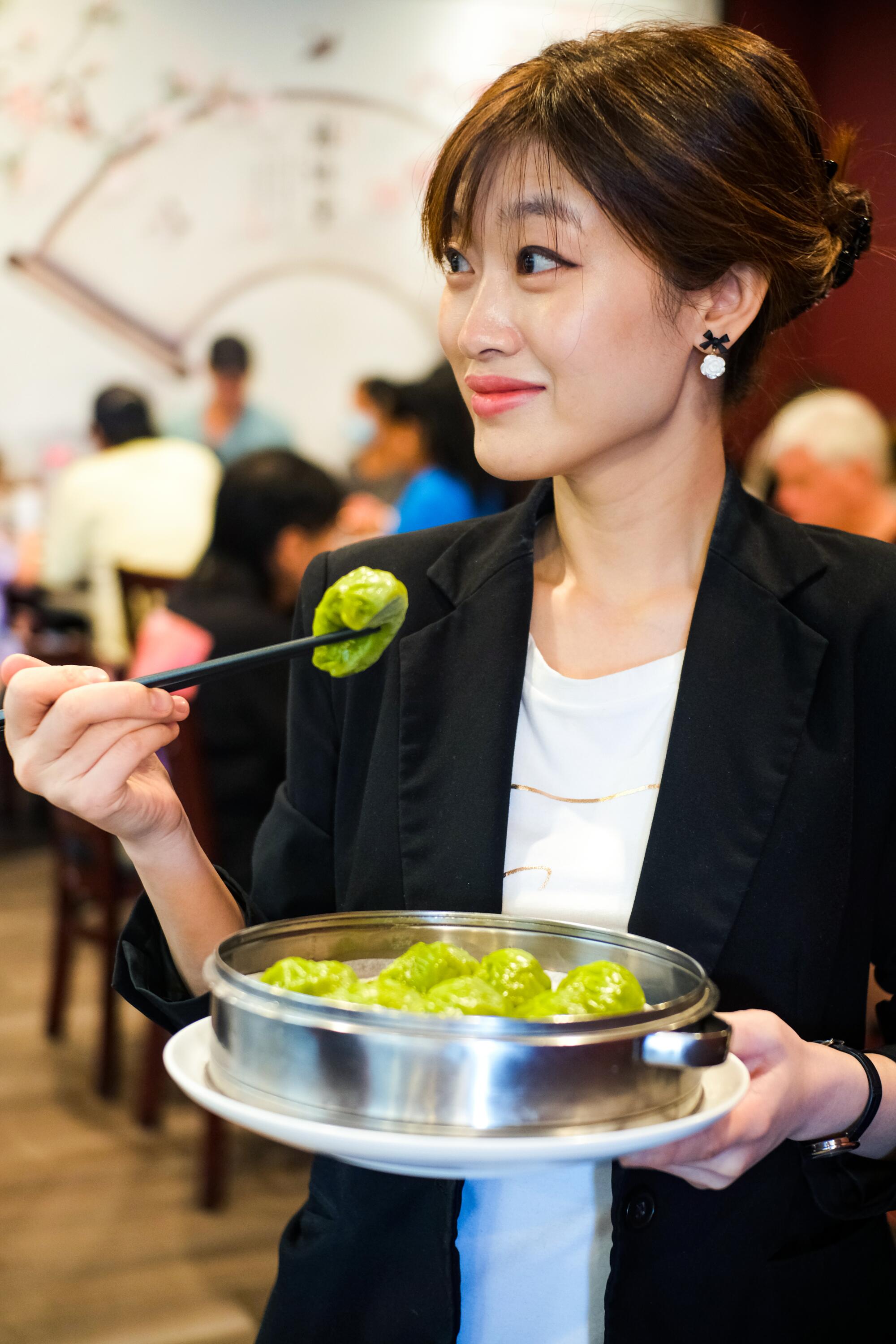
I’m naive about Shanghai Taste’s popularity. I show up for lunch on Monday at 12:30 and a staffer quotes me an hour and 15 minute wait. Lesson learned: Sign up for the Yelp wait list ahead of time. But it gives me time to wander the complex. I start the day with desserts: an appetite-revving mango-chile pop from the Paleta Bar nearby and hot, fish-shaped taiyaki filled with custard from SomiSomi a couple of buildings over. There is still plenty of room for soup dumplings.
Keep roaming
As with Li and Muscaglione, Bank Atchawaran, who runs the Thai restaurant Lamaii a block from Shanghai Plaza, earned his success through years of name recognition in the community. Atcharawan was formerly a sommelier at Lotus of Siam, the off-Strip Thai restaurant with a remarkable wine program made famous by Jonathan Gold during his years writing for Gourmet magazine. Atcharawan opened his first restaurant, Chada Thai & Wine, in Chinatown in 2012; it closed in 2018 and he regrouped with Lamaii a year later.
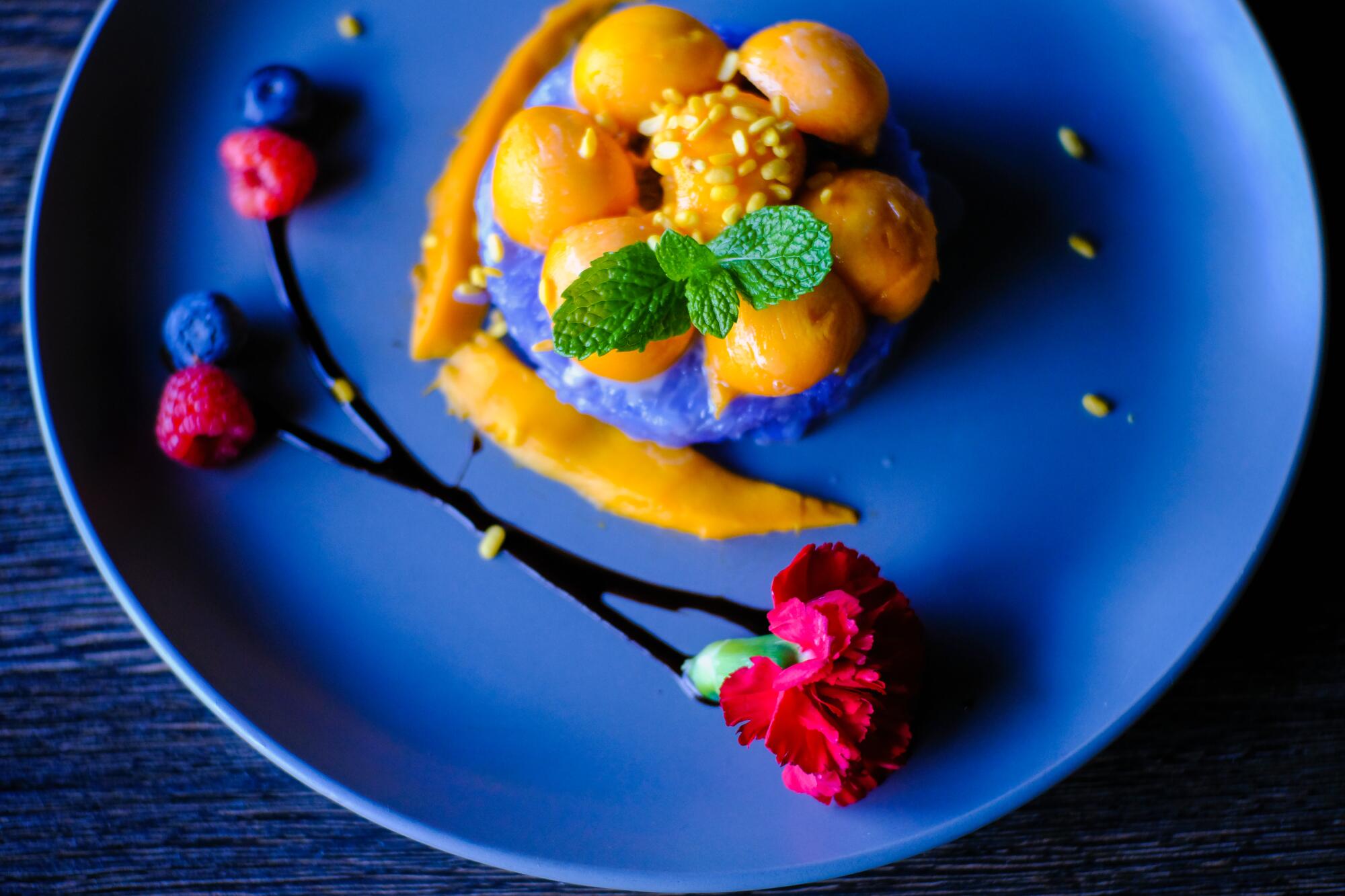
Gray leather booths line the dining room below rows of lantern chandeliers casting coppery shadows. The menu charts dishes from the breadth of Thailand: Peppercorn-spiked kua king with pork from the south can be ordered with a comforting bowl of kao soi from the north. Alongside gaeng rawaeng, golden and earthy with turmeric, and crab curry with vermicelli I disappear into a bottle of 1990 Reichsgraf von Kesselstatt Ockfener Bockstein Riesling Auslese. It’s nearly dessert wine in its sweetness but ends up accentuating the layers of spice. Lamaii happens to be quiet during a Sunday dinner; it should be filled nightly with local and visiting wine geeks coming from anywhere in the city.
Aburiya Raku needs no encouraging words. Its reputation has arguably tractor-beamed more diners to Vegas’ Chinatown than any other restaurant. Chef-owner Mitsuo Endo opened his robata grill in 2008, wowing with his instincts for cooking skewered proteins and vegetables over oak binchotan charcoal with such precision that you can discern the deliberate nuances of char and smoke. He followed with dessert bar Sweets Raku in a separate building of the same strip mall in 2013. In the pandemic its squiggly, dramatically plated creations were dialed back, but it remains an indulgent midday stop for chocolate soufflé baked with banana pudding and finished with cinnamon custard.
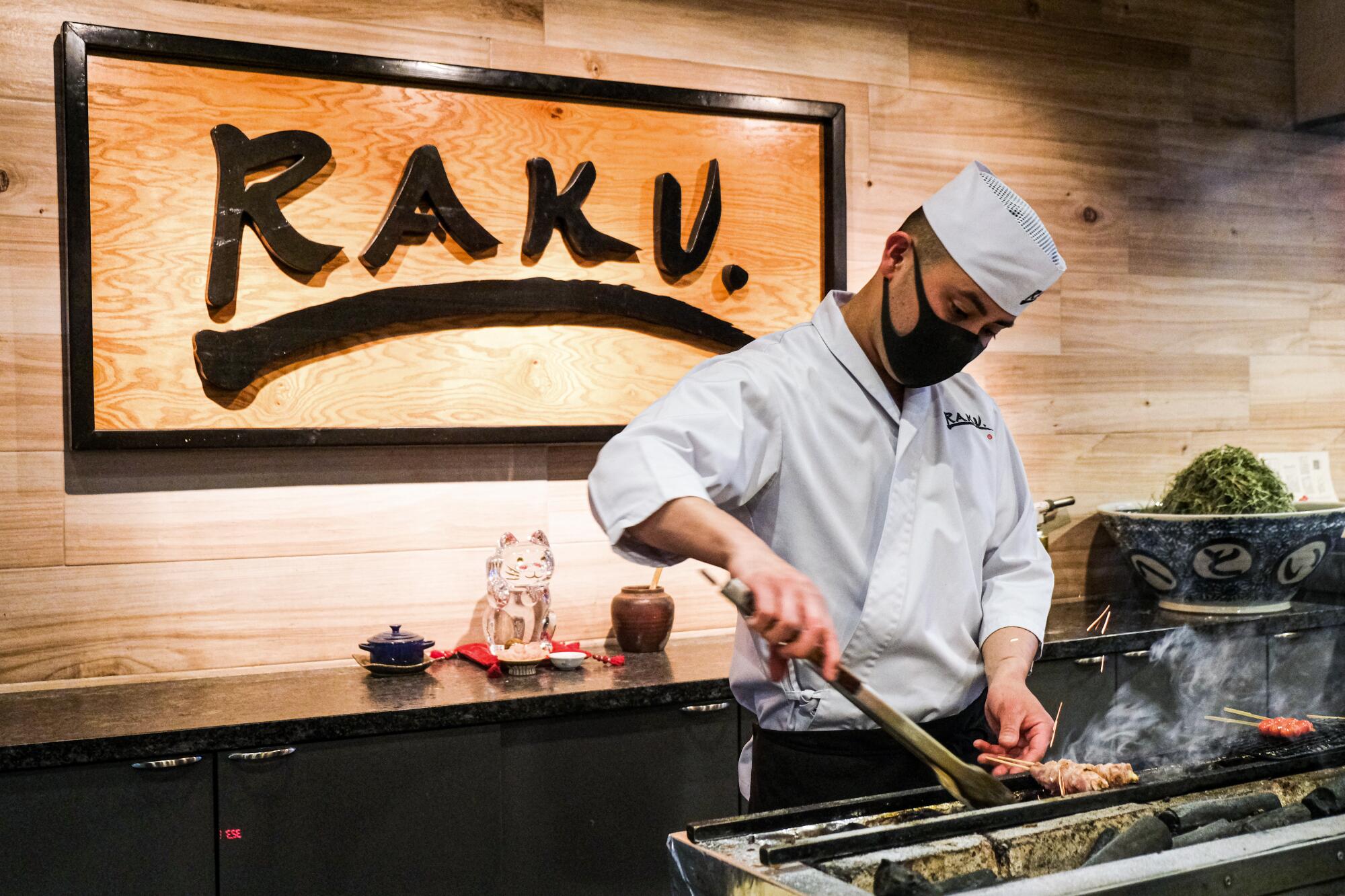
Endo’s third Vegas restaurant, Toridokoro Raku, opened in July 2020; the emphasis is on a gamut of poultry cuts prepared with exacting precision. Behind a glass partition, flames surge from the grill as chef Yoshiya Tomori lines its grate with skewered chicken thighs, gizzards and hearts. Tsukune, ground chicken formed in the shape of a drumstick and served with an egg yolk for dipping, is exceptional. A $75 omakase makes for a decision-free tour of the menu, including an appetizer set with tastes of Endo’s cumulous homemade tofu, though you may want to add an order of chicken oysters, the prized oval pieces of dark meat cut from the back of the thigh.
If you miss foie gras in California, a trip to Toridokoro Raku for liver cloaked in camphire scents might be reason enough to visit Vegas.
One caveat: The restaurant resides in the Flamingo Arville Plaza, a walkable mile south of Chinatown Plaza. Chinatown’s borders are not official, though they are ever-expanding, but no one would consider this location in the district. Not yet, anyway. So forgive me, as with Rainbow Kitchen, for occasionally coloring outside the lines. But when it comes to Vegas’ most exhilarating dining community, I’m considering it permissible to expand its borders while stretching my waistline.
Where to eat in and around Las Vegas Chinatown
Rainbow Kitchen: 7537 S. Rainbow Blvd., Las Vegas, (702) 960-7577
Pho Ga Tony Tony: 3775 Spring Mountain Road, Las Vegas, (725) 204-8084
Taiwan Deli: 4300 Spring Mountain Road, Las Vegas, (702) 222-3435, taiwandeli.com
8 Oz Korean Steakhouse: 4545 Spring Mountain Road, Las Vegas, (702) 909-3121, 8ozkbbq.com
Fukuburger: 3429 S. Jones Blvd., Las Vegas, fukuburger.com
China Mama: 3420 S. Jones Blvd., Las Vegas, (702) 873-1977, chinamamavegas.com
The Paleta Bar: 4258 Spring Mountain Road, (702) 330-0974, thepaletabar.com
SomiSomi: 4284 Spring Mountain Road, (702) 473-9628, somisomi.com
Lamaii: 4480 Spring Mountain Road, (702) 238-0567, lamaiilv.com
Aburiya Raku: 5030 Spring Mountain Road, Las Vegas, (702) 367-3511, raku-grill.com
Sweets Raku: 5040 Spring Mountain Road, Las Vegas, (702) 290-7181, raku-grill.com
Toridokoro Raku: 4439 W. Flamingo Road, Las Vegas, (702) 337-6233, raku-grill.com
More to Read
Eat your way across L.A.
Get our weekly Tasting Notes newsletter for reviews, news and more.
You may occasionally receive promotional content from the Los Angeles Times.
